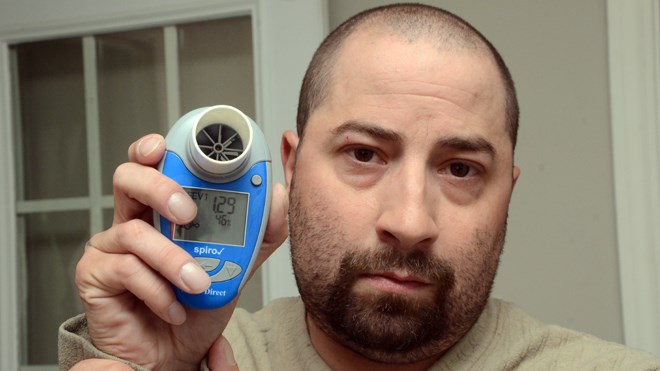As a cystic fibrosis patient and a double-lung transplant recipient, Sudburian Luc Robidas knew it was just a matter of time before his body rejected the lungs he received on Sept. 10, 2011.
Cystic fibrosis is a genetic lung disease and is the most common fatal genetic disease affecting Canadian children and young adults.
At present, there is no cure. Double-lung, heart-lung and liver transplants are the only definitive treatments for CF patients with progressive disease.
About a year and a half ago, Robidas said he woke up one morning to find his lung function had dropped by almost half. Lung function is measured in lung litres, he said. He was reading 3.4 litres on his spirometer one day, then it dropped to 1.8 the next day.
A visit to the doctor and a several tests later confirmed his body was starting to reject the lungs that saved his life six years earlier.
“There's nothing you can do about your body rejecting the lungs,” he said. “It's like you're buying time. It's inevitable. One day I was fine — my lung function was fine, and I was feeling great. The next morning, I woke up and half my lung function was gone.”
Up to that point, Robidas said he didn't feel any different, and that he was surprised when the reading was that low. During his testing, he was given a high dose of steroids to try and prevent the rejection, but that lead to pneumonia, which took another hit on his lung function.
He said if it wasn't for the difficulty breathing, he would feel completely fine.
It was a different story for his first lung transplant in 2011. Before the transplant, Robidas' lived life on a schedule of two- to three-hour treatments several times a day to clear his lungs of mucus buildup. Post transplant, he said now all he has to do is take a handful of pills every day to live a more normal life.
While he isn't shocked he needs another transplant, he wasn't expecting it to happen so soon.
Robidas met with doctors on Aug. 31 to discuss his eligibility for a the lung transplant. He got a call the next day confirming testing would start within the next few months to prepare for the transplant.
“The doctors told me I'm a perfect candidate for the transplant,” he said. “On paper, I'm perfectly healthy. It's just my lungs are failing, and that's what makes me a good candidate for the transplant. Hopefully, by Christmas, I'll be on the transplant list.”
Lung transplants aren't necessarily on a first-come, first-served basis, he said. The priority is whether the lungs are a perfect match for a particular patient, so someone who is on the list for four months could very well receive a set of lungs before someone who has been on the list longer.
Before his transplant in 2011, he had been on the waiting list for about four months.
Now, in order to fulfill his eligibility for a new set of lungs, Robidas and his wife, Jen, have to move to Toronto to be closer to Toronto General Hospital for when the time arrives for the transplant. That means they have to uproot their lives, and move to one of the most expensive parts of Toronto – the downtown.
Luckily, Jen is able to transfer her job, Robidas said. He receives money through the Ontario Disability Support Program, but unfortunately, they deduct 50 cents for every dollar his wife makes. That means paying for rent in downtown Toronto will present yet another challenge for Robidas in an already troubling time.
When he received his first transplant in 2011, Robidas and his wife managed to rent a one-bedroom apartment in a decent neighbourhood for $1,450 a month. Today, that same apartment is renting for about $2,000 a month, which is “absurd,” he said.
The couple managed to find another decent one-bedroom apartment for a cheaper rate, but finances are still going to be tight, he said.
Robidas said he's disappointed there are few government programs available to help would-be transplant recipients with finances while they are on the waiting list. He said if it wasn't for his wife being able to transfer her job, he doesn't know what he would do.
The Trillium Gift of Life Network will be providing some funding to help with costs on a monthly basis, he said. They've looked at other funding sources, as well, but so far no one has been able to help.
In order to offset the financial burden of moving to downtown Toronto, Robidas and his wife are selling off most of their belongings. The couple will host a fundraising yard sale on Sept. 16 at 1375 Falconbridge Rd. There will be household items, holiday decor, sporting goods and more, with all proceeds going to relocating to Toronto.
“We had a good life here, and now we have to sell everything,” he said. “What else can you do. It's sad. We have support from our family and friends, but that should be a last resort. There should be a government program that is able to help us.”
Furthermore, a GoFundMe account has been set up at with the goal of raising $5,000 to help with their financial needs while Robidas awaits his lung transplant.
